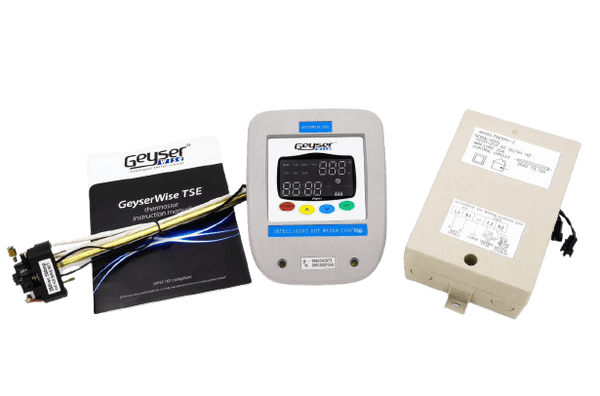Comprehending the Common Issues Associated With Geyser Timers for Effective Water Heating
The effective performance of geyser timers is essential for maximizing water heating performance, yet customers typically experience a series of common problems that can compromise performance. Malfunctions, wrong settings, and compatibility challenges are simply a few of the barriers that can emerge, possibly causing raised energy costs and reduced dependability. Furthermore, power supply inconsistencies and the requirement for routine maintenance can complicate issues better. Comprehending these factors is essential to ensuring that geyser systems operate at their best, inviting a better evaluation of the options that can deal with these common problems.
Common Breakdowns

One widespread malfunction is the failure of the timer to initiate home heating cycles. This can take place due to electric issues, such as a blown fuse or faulty wiring, protecting against the timer from receiving power.

Incorrect Timer Setups
Misconfiguration of timer settings is an usual concern that can bring about considerable inadequacies in geyser operation. When timers are established incorrectly, they may activate the hot spring at suboptimal times, leading to either inadequate heating of water or extreme energy consumption. For instance, if the timer is set to switch on during height electricity hours, it not only pumps up utility costs yet additionally brings about unneeded pressure on the electrical infrastructure.
Furthermore, incorrect timer setups can interfere with the accessibility of warm water when required - geyser timer. A poorly set up routine may leave houses without hot water during optimal usage periods, creating aggravation and irritation. Conversely, constant procedure because of misconfigured timers can lead to getting too hot, damaging the hot spring and raising maintenance expenses
Users should acquaint themselves with their hot spring's home heating demands and change the timer to align with their specific demands. Correctly configured timer setups eventually contribute to a more lasting and cost-efficient water heating solution.
Compatibility Concerns
Compatibility problems can considerably impact the efficiency of hot spring timers, specifically when incorporating with different heating unit or wise home innovations (geyser timer). Many hot spring timers are created to work with particular types of water heating systems, such as resisting burner or gas-fired systems. If a timer is not compatible with the furnace, it may not operate properly, leading to ineffective water heating or perhaps damages to the system
Furthermore, as smart home innovation remains to develop, the integration of geyser timers with home automation systems can pose difficulties. Not all geyser timers use the same degree of connection, which can impede their capacity to interact properly with mobile applications or smart centers. Users may find themselves unable to manage their hot spring timers remotely or set routines that straighten with other wise devices in their home.
Furthermore, the compatibility of hot spring timers with existing electrical facilities can additionally be a concern. Variations in voltage rankings, wiring standards, and circuit arrangements can cause operational problems. Consequently, it is important to extensively analyze compatibility with both the heating tools and the home's electrical system before choosing a hot spring timer to make certain optimum efficiency.
Power Supply Issues
Power supply problems can badly prevent the functionality of geyser timers, leading to undependable procedure and boosted power prices. These concerns might originate from poor voltage supply, irregular power resources, or damaged circuitry. A hot spring timer calls for a steady electrical input to function optimally; fluctuations can lead to erratic performance or full failing.
Moreover, incorrect voltage rankings can harm the timer, making it inoperative. It is crucial to make certain that the hot spring timer is compatible with the electric specs of the setup website. In addition, power rises or interruptions can interrupt the timer's programs, leading to ineffective heating cycles and unanticipated operational delays.
In instances of consistent power supply troubles, consulting a certified electrician is see suggested to guarantee that the electrical framework adequately sustains the geyser timer's needs. Appropriate attention to power supply can improve the effectiveness and durability of the hot spring timer system.
Upkeep and Troubleshooting
Normal upkeep and troubleshooting are crucial for making certain the trusted procedure of geyser timers. Frequently clean the timer unit and bordering locations to avoid dust accumulation, which can interfere with its procedure.
If issues develop, begin fixing by resetting the timer to its default settings. Confirm the power supply to ensure the timer is getting adequate voltage.
In addition, consider organizing expert inspections every year to resolve prospective concerns proactively. This method can expand the lifespan of the geyser timer and maximize its efficiency. By prioritizing upkeep and effective troubleshooting, individuals can minimize typical troubles and make sure regular efficiency from their hot spring timers.
Verdict
Finally, acknowledging and addressing the typical concerns associated with hot spring timers is vital for maximizing water home heating efficiency. Timer malfunctions, inaccurate settings, compatibility difficulties, and power supply problems can substantially affect performance. Regular upkeep and troubleshooting can minimize these concerns, guaranteeing that hot spring systems run dependably and properly. By proactively managing these factors, energy effectiveness can be improved, causing enhanced water home heating performance and minimized functional expenses.
The effective functioning of hot spring timers click here for info is crucial for maximizing water home heating effectiveness, yet users commonly run into an array of typical issues that can endanger efficiency. When timers are established improperly, they may turn on the geyser at suboptimal times, resulting in either not enough home heating of water or excessive energy consumption.Compatibility problems can dramatically influence the performance of hot spring timers, specifically when integrating with various home heating systems or smart home technologies. Recommended Reading Numerous hot spring timers are created to work with specific kinds of water heating units, such as resistive home heating elements or gas-fired systems.In verdict, acknowledging and dealing with the common issues associated with geyser timers is crucial for optimizing water home heating efficiency.